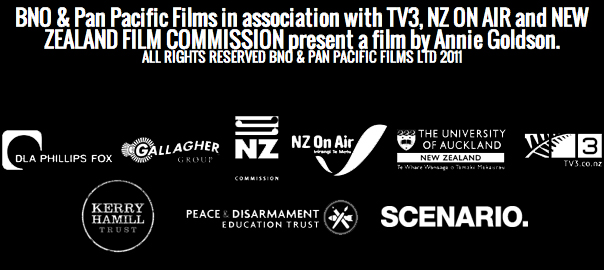-
Blessing day shoot NZ
- Posted on 8th Jun
- Category: Director's diary
 James, Annie and Rob at the Blessing with Chakara Lim
James, Annie and Rob at the Blessing with Chakara Lim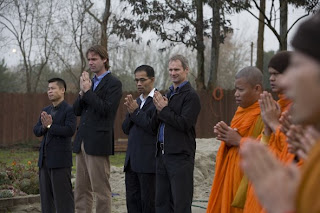 Flag-raising ceremony
Flag-raising ceremonyOur first day’s filming in New Zealand went smoothly, beginning with our being blessed by Buddhist monks at the temple in Takanini. We headed off early to the outskirts of Auckland, where the suburbs blend into farmland. Behind what looked like a farmhouse was a large shed filled with colour, posters, ribbons, cloth — the beautiful burnt oranges and browns of Buddhism. We filmed the preparation, the monks (who came from Laos, Tibet, Thailand as well as Cambodia), mounting flags along a concrete wall at the road frontage, then captured some shots of the Cambodian community drifting in, older women making food, children running around, friends chatting in the early morning light.
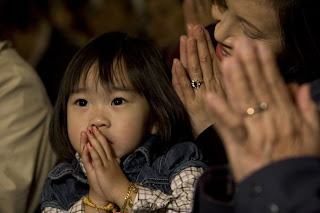 At the Blessing ceremony
At the Blessing ceremonyIt felt much like Cambodia although I tried to frame some of the Kiwi elements in shots, too — the landscape, our particular washing lines, Non Smoking signs and so on. One of the monks then oversaw the flag-raising -- the New Zealand and Cambodian flags mounted together. There was some haunting singing by the flag pole, during which it began raining which felt atmospheric.
The actual blessing was amazing too, about 10 monks all lined up chanting and tossing water on us with slender sticks. The chanting is very mesmeric. Rob, James and I each spoke briefly, with our associate producer Chakara Lim translating skilfully. The community is very interested and incredibly supportive – some had travelled from Wellington for the event.
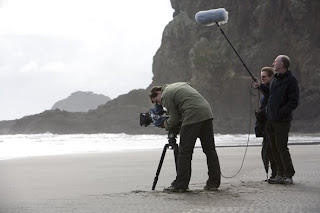 The crew at Piha
The crew at PihaAmy Wang from Asia Down Under was filming too, a spot on the “making of” for the show – so people should look out for that. She interviewed us, but also Sarath Lim, the president of the Cambodian (Khmer) Community of New Zealand, a gracious and dignified man who underwent the trauma of living in Cambodia under the Khmer Rouge. We then took off for Piha Beach, where we filmed the “briny” which was doing its usual West Coast thing, wild waves, cascading skies etc. I want these shots as an “opener” to a sample I’m editing to help us with further fundraising. Although we have gotten good funding from NZOA and TV3 and in fact, many donations from the Cambodian community and others, this is an ambitious film as we will be travelling with a crew around Cambodia and in addition, we would like to use archives which can be expensive.
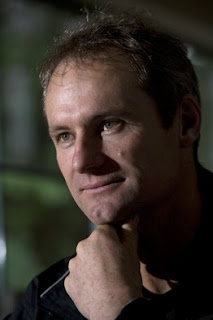 Rob Hamill
Rob HamillI want to follow up our Hotdocs contacts with an example of what we have filmed thus far so will send them a sample as soon as I can. The sea plays a bit part in our film – the Hamills, as children, swam, surfed and sailed around Whakatane and the Heads; Kerry was seized off his beloved boat, Foxy Lady; and Rob, of course, achieved the almost unachievable, rowing the Atlantic in 41 days. After getting some picturesque shots off the rocks, he headed for the warmth of Dave the soundperson’s house, where we did another “diary interview” with Rob, following up one we had done in the UK, and then we relocated to the couch, where he read through some of the so-called “confessions” extracted from his brother and John Dewhirst, the Englishman who suffered the same fate as Kerry.
Understandably, Rob got pretty emotional and it can be difficult to keep filming at those times – one always feels so intrusive. The final scene of the day was my “replicating” one of the typed confessions – James had tracked down an old Remington and we finished up the day with me punching out “highlights”. Those Remingtons certainly have a different finger action to my MacBook Pro. So all in all, it was a pretty full day and I look forward to seeing Jake’s footage. Here are some stills from the day, filmed by a real “pro” Marcel.
-
Annie's updates from the US and UK
- Posted on 22nd May
- Category: Director's diary
 Rob and Peter
Rob and Peter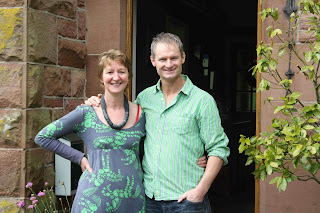 Rob and Hilary
Rob and HilaryAfter sending my Hotdocs party clothes back to New Zealand, Peter Gilbert (one of our two DOPs) and I set off to begin shooting. We started with three historians/participants in the US. All have had a real commitment to Cambodia — for example one of the three Elizabeth Becker lived in Cambodia up until 1975 when she was thrown out by Pol Pot. She was then asked back by him for a propaganda tour and one in her party of three was murdered during that last trip. The three historians all managed to make Cambodia’s history, a complicated Cold War affair, lucid and accessible so that was an encouraging start.
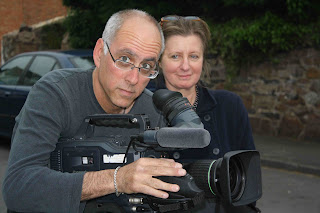 Annie and Peter
Annie and PeterWe then set off for the UK which went really well although emotionally difficult at times. We started in Loughborough in the midlands and interviewed two Englishmen who had been on Foxy Lady just prior to the fatal voyage and had not known of the murders until a few years ago. We filmed them in a very picturesque pub — despite the three decades intervening, they remained very emotional. And then we headed north to interview Hilary, John Dewhirst’s sister (he was the Englishman tortured and killed along with Kerry Hamill).
Although I have known about Pol Pot of course, the reality of the pain he has caused really hit me through Hilary. She lives in this exquisite Lake District area full of old stone walls and cute villages, not far from where she and John were brought up. She has been unwilling to be interviewed before about her brother and in this instance, is prepared to because of Rob Hamill ‘s(the brother of the murdered Kiwi) key role in the film. He of course will be confronting the man, Comrade Duch, responsible for the treatment of their two brothers. I know Rob will be speaking for Hilary as well as for himself.
Rob is really strong on camera — a real Kiwi sportsperson who unusually enough, is prepared to express grief and emotion. Both he and Hilary can barely comprehend what the Cambodians must have been through — and mentioned the trauma of the country constantly.
And Peter Gilbert as DOP was brilliant not just on camera but also as a “directorial advisor”. Even though I have taught myself for so long, I am self-taught, so it was great to feel a bit “mentored”. Plus he is funny and communicative and really helped during the tough moments. So all good.
-
Before taking off to London - Rob Hamill
- Posted on 13th May
- Category: Rob's journey
Well, I’m in the ‘as you’d expect’ chaos mode at the moment. Nearly ready to get in the car and head north to the big smoke (Auckland, of course) and board my plane destined for London, England to hook up with Annie Goldson and Peter Gilbert.
I would like to take this opportunity to thank all those who have played a significant role already in helping us get this far. The Cambodian community based in New Zealand have been incredibly helpful and generous but a particular mention at this point must go to Chakara Lim. He has been a pivotal person in helping us make contact with community leaders and has shown us the active and colourful culture thriving here in New Zealand.
I can’t emphasis enough how important this project is in reminding the world, lest we forget, of the atrocities in Cambodia. I was reminded today of this very issue whilst having a hair cut. I had to ask for a specific cut (#4 on sides etc) so that it’s consistent each time we film. I was asking how best to achieve this and in their inquisitiveness the two hairdressers in ear shot naturally asked why. When I got to mentioning Pol Pot by name they said, “Who?” They didn’t know anything about the Khmer Rouge either. Yet they knew plenty about Adolf Hitler. If I had said Pol Pot was the Adolf Hitler of Cambodia they would have immediately understood. As it is many people around the world have a similar lack of understanding of the recent history of this country.
This needs to be told in the hope that it doesn’t happen again.
- Rob Hamill
-
Hotdocs - Annie's thoughts before the trip...
- Posted on 11th May
- Category: Director's diary
Am packed and ready to attend Hotdocs to pitch Brother Number One before a powerful and discerning group of funders. It all takes place in a kind of cloister at the University of Toronto – thousands of other documentary producers attend, either sitting in the bleachers or hanging from rafters it seems.
Hotdocs for me is one of the finest documentary events in the world and this is a great, albeit a bit scary opportunity. We have gotten generous support from TV3 and New Zealand on Air and some fabulous private investors, but the project is ambitious. The reality is that the war crimes tribunal currently underway in Phnom Penh sends prices sky-rocketing so we need to eke out our dollars to make sure they last the distance. James Bellamy and Rob Hamill, the originating producers have been toiling away on research and fundraising tirelessly for two years now—and thanks to their efforts, it seems now the film is on a roll.
Somehow Hotdocs—as both a festival and a marketplace—manages to be big and professional but still very personal. It was where I premiered Punitive Damage in 2000, which was to be a significant film for me, my first cinema release and a film that received a lot of critical and some commercial success. Punitive Damage followed New Zealander Helen Todd who sued an Indonesian general after her son Kamal was shot and killed in the Dili massacre in 1991.
By chance, the film was released as huge changes unfolded in Asia and East Timor – the run up to the referendum on independence (thousands of Timorese were intimidated and subjected to violence, interrogation and disappeared, the trashing of Timor by departing Indonesian military), and the nation’s final independence. I was back the following year to Hotdocs to pitch Georgie Girl, my next film, which showed in the festival two years later – then last year, An Island Calling screened and this year, I will be back again with Brother Number One. So Hotdocs and I, I have to say, have a history - and it will be great to catch up with a documentary community whose spirit and determination I treasure.
In many ways, this new film replicates some of the horrendous background elements of Punitive Damage – Cambodia, like Timor, was caught in the crossfire of Cold War politics, with Kissinger playing a bit part behind the scenes. Cambodia and Timor lost almost a third of their population through execution and starvation, Timor to the Indonesian occupiers, who were funded by the US and Britain, Cambodia to the Khmer Rouge, funded by China but some would argue, given impetus after the US bombed Cambodia and sent thousands of angry peasants into the arms of the ideologues.
Both films too deal with attempts at finding justice. New Zealanders who unwittingly found themselves drawn into the tragedies—whose determination speaks of an attempt to ameliorate some of their own grief and pain, but also a willingness to speak for local populations whose suffering was almost unimaginable.
After Hotdocs, I will commence filming – first in the US with three historians, Elizabeth Becker, Ben Kiernan and Peter Maguire, and then in the UK – with friends and family of John Dewhirst, the young Englishman tortured and murdered alongside Kerry Hamill. Rob is coming too, and will meet John’s sister Hilary for the first time. I know it will be very emotional for all of us...
-
Brother Number One selected to be pitched at The Documentary Forum at Hotdocs in Toronto
- Posted on 29th Apr
- Category: Director's diary
Brother Number One, a working documentary on the torture and murder of New Zealand yachtie Kerry Hamill by the Khmer Rouge in 1978 has been selected to be pitched at the prestigious TDF forum at Hotdocs, the International Documentary Festival in Toronto. Only 25 projects were selected from over 350 submissions. Most of the major broadcasters, theatrical funders, and distributors worldwide attend the TDF looking for new projects to invest in.
In the mid-70s, Kerry bought a yacht, Foxy Lady, and was running a charter business out of Darwin around South East Asia with a Canadian friend, Stuart Glass. Along with an Englishman, John Dewhirst, they were sailing towards Bangkok when they hit a storm. Mistakenly entering Cambodian waters, Foxy Lady was seized, Stuart Glass shot and killed, while the other two men were taken to the notorious Tuol Sleng prison, overseen by Pol Pot’s main executioner, now turned Christian, Comrade Duch. Over 14,000 Cambodians were killed at the torture centre, which is now a genocide museum.
Kerry’s younger brother Rob Hamill, an Olympic and Trans-Atlantic champion rower, will travel to Cambodia to retrace the steps taken by his brother and John Dewhirst, speaking to eyewitnesses, perpetrators and survivors. Rob’s journey will culminate in his giving a Victim’s Statement before the Extraordinary Chambers of the Court of Cambodia. Comrade Duch, the man that oversaw his brother’s torture and murder is currently on trial at the ECCC. New Zealander Dame Sylvia Cartwright is a senior judge on the tribunal.
The film will also explore the history of Cambodia in an attempt to comprehend the enormity of the genocide that occurred in Khmer Rouge years 1975-1979. A former French colony, Cambodia was sucked into the vortex created by the Cold War and was illegally bombed by the Nixon administration which some see as creating the conditions for the rise of the fanatical Pol Pot.
Brother Number One is being produced by James Bellamy, Annie Goldson and Rob Hamill. Annie is directing, and after Hotdocs will film in both the US and UK with historians and with Dewhirst family members and friends. American DOP Peter Gilbert (Hoop Dreams, At the Death House Door) an Academy-nominated cameraperson, will shoot with Annie in the US and UK. Jake Bryant (The Artstar and the Sudanese Twins) will film in Cambodia, New Zealand and Australia later this year.
The film has received generous funding from TV3 and New Zealand on Air and is currently seeking further presales. The crew is working closely with the Cambodian community in Auckland who will conduct a blessing prior to the commencement of production.

